Curious about biblical wisdom? Discover the four types of oracles and how they shape our understanding of prophecy and promise.

Four Types of Oracles in the Bible
As the saying goes, 'A stitch in time saves nine,' understanding the four types of oracles in the Bible can save you from misconceptions and enlighten your spiritual journey.
You'll explore oracles of judgment, which warn nations and individuals; oracles of salvation, offering hope; conditional oracles, which depend on the response of the people; and messianic oracles, pointing to a future hope.
Each type holds a key to interpreting historical contexts and their impact today. Unraveling these oracles will not only deepen your biblical knowledge but also challenge you to reflect on their relevance in our modern world.
Why not embark on this exploration to uncover the profound wisdom embedded within these ancient texts?
Key Takeaways
- Oracles of Judgment warn of consequences for moral failings and urge ethical living.
- Oracles of Salvation provide hope and a call to return to righteousness.
- Conditional Oracles depict outcomes based on human actions like obedience or rebellion.
- Messianic Oracles foretell the arrival of a savior to fulfill divine promises.
Understanding Biblical Oracles
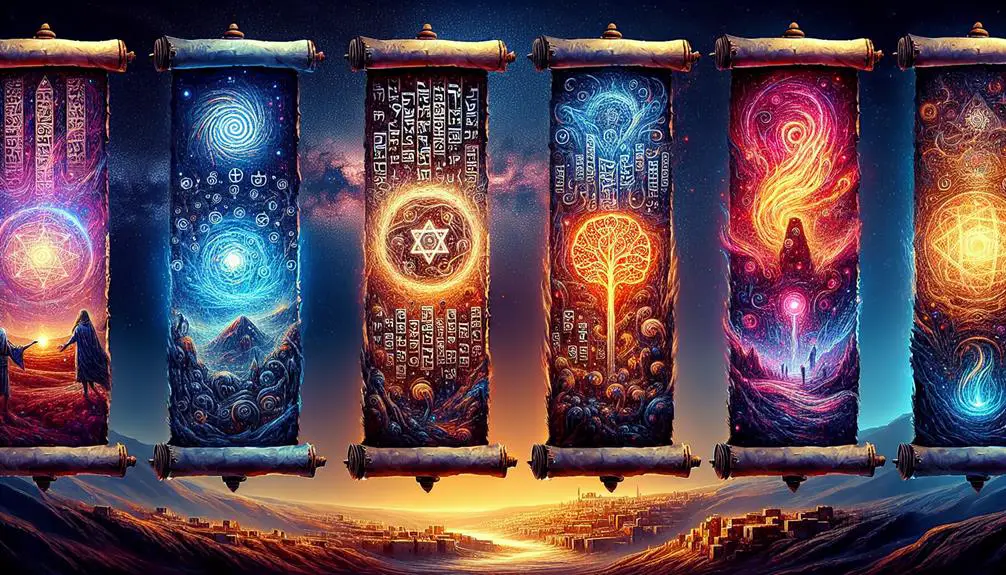
In the context of biblical literature, an oracle typically refers to a divine communication or revelation, often delivered through a chosen intermediary, that played a pivotal role in guiding, warning, or informing individuals or entire communities about God's will. The interpretation of these oracles is crucial, as it directly influences the understanding and response of the intended audience. Scholars, such as Brueggemann (1997), emphasize that the prophetic accuracy of these oracles wasn't just about future predictions but also about offering a divine perspective on current events and moral guidance.
The challenge in oracle interpretation lies in deciphering the often symbolic and metaphorical language used. For instance, the Book of Daniel contains visions that have been subject to various interpretations over centuries, reflecting the complexities of understanding divine messages (Collins, 1993). Additionally, the context in which these oracles were received plays a significant role in their interpretation. The socio-political and historical backdrop of ancient Israel, for example, influenced how oracles were understood and applied (Coogan, 2009).
Thus, understanding biblical oracles involves a careful analysis of their content, the context of their delivery, and the interpretative framework used by both the original audience and modern scholars. This analytical approach ensures a deeper appreciation of the oracles' significance and their role in conveying God's will.
Oracles of Judgment

Oracles of judgment in the Bible serve as divine warnings, often communicated through prophets, to alert communities or individuals about their moral failings and the impending consequences if they do not amend their ways. These messages, steeped in judgment symbolism, underscore the gravity of deviation from divine commandments. Prophetic accuracy in these oracles is notable, as historical outcomes often mirrored these stark warnings.
Judgment Symbolism |
Prophetic Accuracy |
|---|---|
Fire representing divine wrath |
Accurate predictions of exile |
Darkness symbolizing calamity |
Precise foretelling of natural disasters |
Drought as a sign of divine displeasure |
Detailed accounts of societal collapse |
These symbols, vivid and powerful, serve not only as metaphors for divine dissatisfaction but also as precise indicators of the consequences of continued disobedience. Prophets like Isaiah and Jeremiah, conveying these oracles, didn't merely predict doom; they offered a mirror to the society, reflecting its moral health and the dire need for repentance.
In this scholarly examination, it's clear that oracles of judgment were not erratic threats but measured responses to human actions, meticulously detailed by prophets to ensure that the message was both understood and heeded. This dichotomy between divine forewarning and human agency underscores the complexity and depth of biblical oracles of judgment.
Oracles of Salvation
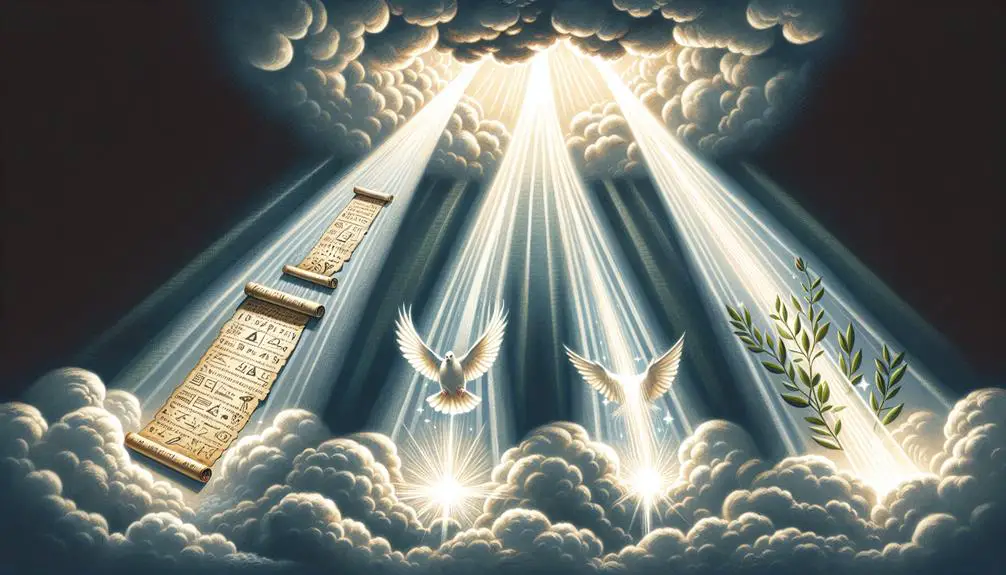
While oracles of judgment depict the consequences of straying from divine commandments, those of salvation offer a contrasting vision, promising redemption and restoration for those who return to righteous paths. This shift from retribution to redemption is central to understanding the multifaceted nature of divine communication within the biblical narrative.
Oracles of salvation are pivotal, for they encapsulate:
- Divine hope: These oracles serve as beacons of hope, assuring the faithful that despite current tribulations, there exists a future where peace and prosperity reign. This is vividly illustrated in Isaiah 52:7, where the return of Zion symbolizes the ultimate victory of salvation over judgment.
- Prophetic assurance: Prophets, serving as God's mouthpieces, deliver messages of salvation with unwavering confidence. Their words aren't mere wishes but guarantees backed by divine authority, ensuring that God's promises of deliverance will indeed come to fruition.
- A call to return: Implicit in these oracles is an invitation to repent and realign with God's will. They underscore the idea that salvation is accessible to all who heed the call to righteousness, emphasizing God's enduring mercy and willingness to forgive.
In essence, oracles of salvation embody the quintessence of divine grace, offering a roadmap from despair to hope, from exile to homecoming, and from judgment to forgiveness.
Conditional Oracles
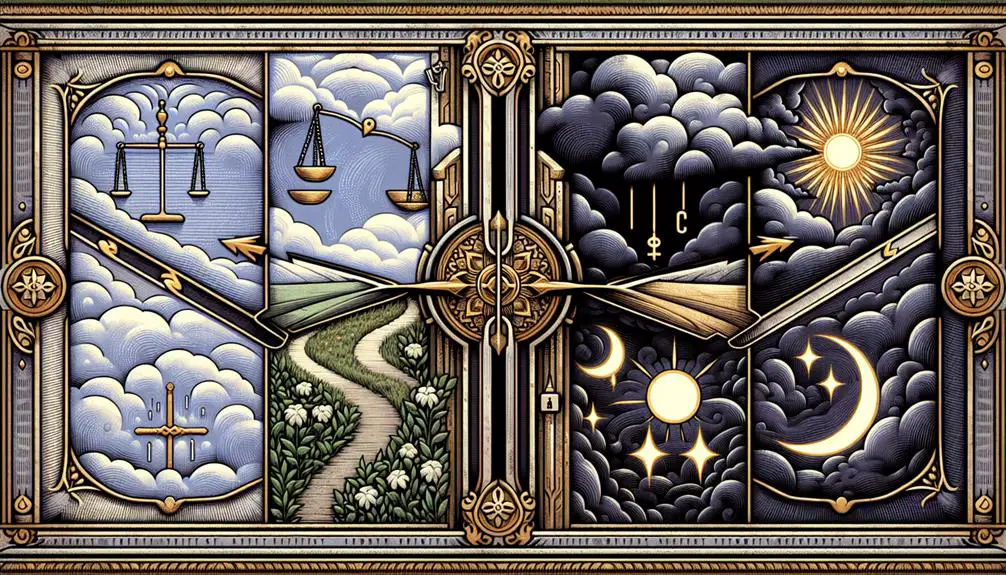
Conditional oracles in the Bible serve as pivotal instruments, delineating the outcomes of human actions through a divine lens, often predicated on the fidelity or disobedience of individuals or communities to God's commands. These oracles come with prophetic conditions, where blessings or curses are contingent upon the people's adherence or disregard to divine directives.
Oracle Type |
Condition |
Outcome |
|---|---|---|
Fidelity |
Obedience |
Blessing |
Disobedience |
Neglect |
Curse |
Repentance |
Sincere |
Restoration |
Rebellion |
Stubbornness |
Judgment |
Faithfulness |
Consistency |
Prosperity |
In understanding these conditional oracles, you're delving into a complex world where oracle interpretations hinge on the dynamic relationship between divine sovereignty and human agency. Prophetic conditions laid out in these oracles underscore a reciprocal covenant; the divine promises are not unilateral but require human response. This complexity enriches the biblical narrative, offering a layered understanding of divine-human interaction. Analyzing these oracles invites you to appreciate the nuanced way in which the biblical texts navigate the space between determinism and free will, making clear that human choices, under the gaze of the divine, profoundly shape the course of history and individual destinies.
Messianic Oracles
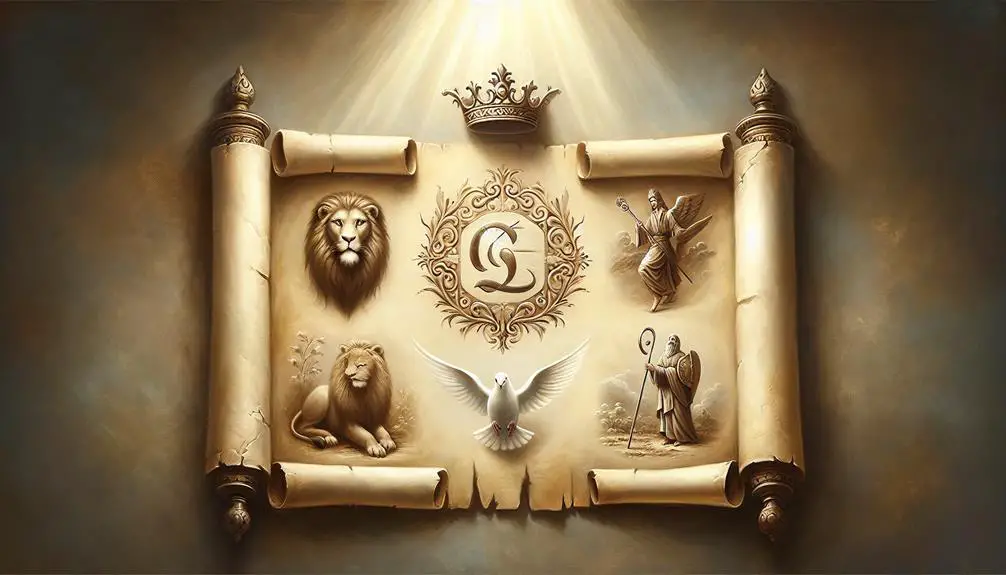
Among the diverse prophetic messages in the Bible, Messianic oracles stand out as they foretell the coming of a savior who's destined to fulfill God's promises to humanity. These oracles, rich in Messianic symbolism, serve as a cornerstone for understanding the complex tapestry of prophetic fulfillment within the biblical narrative.
To grasp the significance of these oracles, consider the following:
- The Seed of David: Messianic oracles often highlight a descendant of David who'll establish an everlasting kingdom. This theme not only emphasizes the historical lineage of the Messiah but also the fulfillment of God's covenant with David.
- The Suffering Servant: Passages, particularly in Isaiah, describe a figure who suffers for the sins of others. This suffering servant motif is pivotal in understanding the Messianic mission as one of sacrifice and redemption.
- The Anointed One: The term 'Messiah' itself means 'anointed one,' pointing to someone chosen by God to lead and save. This aspect of Messianic oracles underscores the divine selection and legitimization of the savior's role.
In analyzing these elements, it's evident that Messianic oracles aren't merely predictive; they're deeply woven into the fabric of biblical theology, offering layers of meaning and insights into the nature of divine salvation.
Historical Context of Oracles
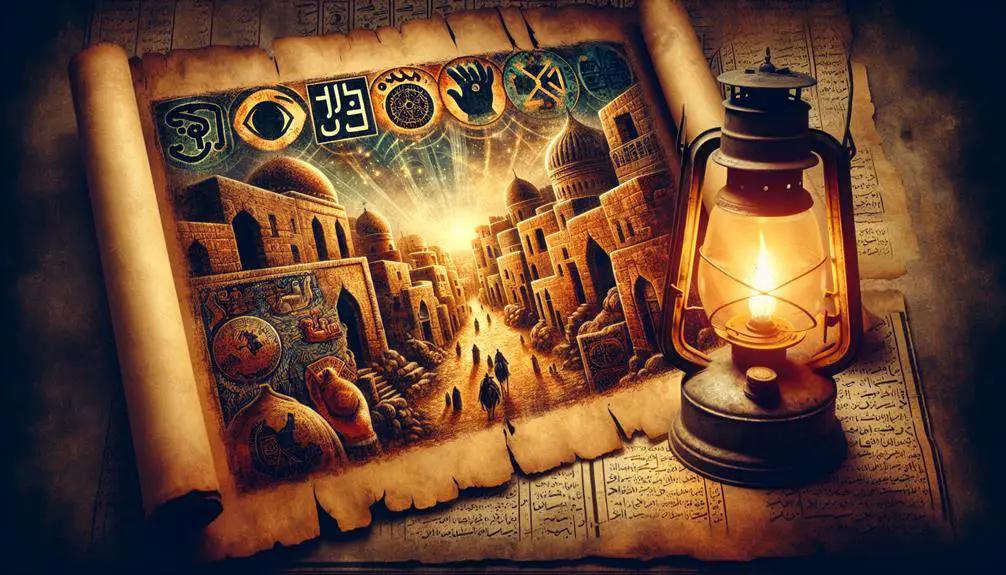
Understanding the historical context of oracles in the Bible is essential to grasp their significance and roles within ancient societies. Scholars like Walton and Hill (2004) have traced oracle origins, highlighting their integral function in communication between the divine and humanity.
This exploration leads us to examine ancient oracle functions, revealing their profound impact on decision-making and societal norms in biblical times.
Oracle Origins Explained
To grasp the multifaceted role of oracles in biblical narratives, it's essential to explore their historical origins, deeply rooted in ancient Near Eastern cultures. The inception of oracle types and their methods of divine communication offer insights into their significant role across various societies. Here are three critical aspects:
- Cultural Integration: Oracles weren't isolated phenomena but integrated within the religious and social fabrics of communities, influencing decision-making and leadership.
- Forms of Divination: Techniques varied widely, from casting lots to interpreting dreams, reflecting diverse approaches to accessing divine wisdom.
- Evolution Over Time: The methods and understanding of oracles evolved, highlighting a dynamic interaction between divine communication and human interpretation within ancient texts.
Understanding these origins sheds light on the complexity and diversity of oracles in ancient narratives.
Ancient Oracle Functions
Delving into the historical context of oracles reveals their pivotal roles in guiding societies through divine counsel and prophecy. You'll find that oracle rituals weren't merely ceremonial acts but sophisticated means of divine communication.
Scholars like Fontenrose (1978) and Johnston (2008) have emphasized how these rituals served as bridges between the divine realm and human concerns, allowing societies to seek guidance on everything from personal matters to state decisions. The meticulous practices surrounding oracles, from specific rites to the interpretation of divine signs, underscored their importance in ancient decision-making processes.
These practices weren't arbitrary; they were deeply embedded in the cultural and religious fabric, highlighting the oracles' central role in navigating the uncertainties of life with divine insight.
The Impact of Oracles Today

Despite centuries separating us from their original contexts, oracles in the Bible continue to shape modern spiritual and ethical perspectives, influencing both personal beliefs and wider cultural norms. The enduring impact of these divine communications is evident in several ways:
- Modern interpretations: Scholars and theologians consistently explore the allegorical and literal meanings of biblical oracles, seeking applications for contemporary issues. This ongoing analysis ensures that the wisdom of the oracles remains relevant, guiding moral and spiritual decisions in a rapidly changing world.
- Technological parallels: In an era dominated by information and artificial intelligence, comparisons are drawn between ancient oracles and modern decision-making tools. This juxtaposition highlights humanity's perpetual quest for knowledge and guidance, underscoring the timeless nature of seeking divine or superior insight.
- Cultural influence: Oracles from the Bible permeate literature, art, and media, demonstrating their significant role in shaping societal values and norms. Their stories and messages inspire creators and thinkers, influencing the moral and ethical fabric of communities.
In analyzing these aspects, it's clear that oracles from the Bible not only provided direction in ancient times but continue to offer wisdom and insight in today's complex world.
Frequently Asked Questions
How Have Interpretations of Biblical Oracles Changed With New Archaeological Discoveries?
New archaeological discoveries have significantly impacted interpretations of biblical oracles. Through textual analysis and understanding linguistic evolution, you'll see how scholars now view these texts in a fresh light.
These findings offer concrete evidence that challenges previous interpretations, allowing for a more nuanced understanding of ancient texts.
As you delve into the scholarly research, you'll find references highlighting how our comprehension of biblical narratives evolves with each archaeological breakthrough.
Can Biblical Oracles Be Linked to Similar Prophetic Traditions in Other Ancient Cultures?
Certainly, you can find threads of similarity weaving through various ancient cultures, much like a tapestry that shares common colors and patterns. Cross-cultural analysis reveals that biblical oracles often echo prophetic parallels in other ancient traditions.
This scholarly approach, akin to piecing together a complex puzzle, highlights how shared human experiences and divine interpretations transcend cultural boundaries. Such analysis enriches our understanding, offering a more nuanced view of ancient prophetic traditions.
How Do Different Christian Denominations Interpret the Messianic Oracles in Relation to Jesus Christ?
You'll find that Christian denominations vary widely in how they interpret messianic oracles in relation to Jesus Christ. These denominational differences stem from diverse interpretive methodologies, each rooted in unique theological perspectives.
Some view these oracles as direct prophecies of Christ's coming, while others see them more as symbolic. This range of interpretations highlights the richness and complexity within Christian theology, reflecting deep scholarly analysis and debate over biblical texts.
Are There Any Documented Instances Where Modern Events Were Predicted by Biblical Oracles?
You're looking for modern predictions in biblical oracles that align with historical accuracy, right?
While some claim that certain events were foretold, it's crucial to approach these assertions critically. Scholarly analysis often reveals that interpretations vary widely, and what might seem like a clear prediction can be ambiguous.
There's no universally accepted instance where a biblical oracle definitively predicted a modern event, underscoring the complexity of correlating ancient texts with contemporary happenings.
How Do Scholars Reconcile Contradictions Between Oracles of Judgment and Salvation Within the Bible?
Navigating nuances, scholars reconcile contradictions between judgment and salvation oracles through textual criticism and hermeneutical approaches.
You'll find they scrutinize scriptures, seeking coherence within the complexities.
By analyzing ancient contexts and employing interpretative strategies, they uncover underlying unity or acknowledge diverse voices in biblical texts.
This analytical, scholarly process involves referencing historical, cultural, and literary insights, enabling a deeper understanding of these seemingly contradictory messages.
Conclusion
In conclusion, have you ever pondered the depth and breadth of oracles in the Bible? These divinely inspired messages, ranging from judgment and salvation to conditional and Messianic prophecies, reflect not just ancient wisdom but also a timeless guide for modern believers.
Scholars like Walter Brueggemann have highlighted their significance, revealing how these oracles shape our understanding of faith and destiny. Today, they continue to influence theological thought, offering insights that are as relevant now as they were millennia ago.

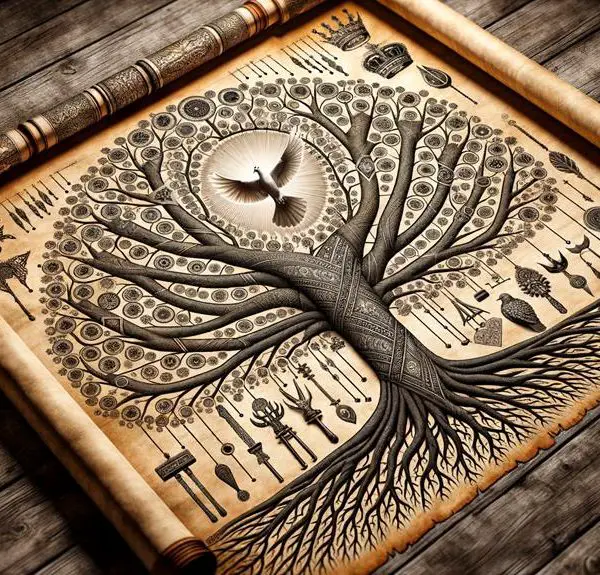

Sign up